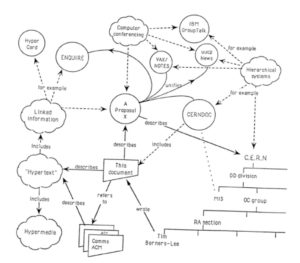Had an opportunity to attend a keynote led by Sir Tim Berners-Lee at the Postgres Vision 2019 conference in Boston last week. At 64, the inventor of the World Wide Web, shows the same rambling demeanor as ever, and with some age he may be even more kinetic, in fact.
Time has seen his baby, the Web, tracked by controversy, a great portion of it occurring of late. The inadvertent role social media giant Facebook played in the 2016 U.K. Brexit plebiscite and U.S. presidential election has lifted the veil, and all is not pretty. Confusion on a wave of Facebook posts ripples anew each day. Clearly, Berners-Lee is quite aware of all this.
At the conference, Berners-Lee spoke about the roots of the Web, as he created it while working at the CERN particle accelerator facilities in the early 1990s – how his boss at the time wrote “vague, but interesting” in the margin of the proposal to do the work – how it was forged as an open source undertaking – how the University of Minnesota’s Gopher protocol stood to compete with his Web, but took a big back seat when the university asserted its prerogative to require a commercial license for Gopher – how ‘free’ is giving way to information for pay that supports journalists one chooses to provide accurate information to one – how he has worked with others to drive the Solid Project, which is a DropBox-like API that gives the user control over their data — more.
The tension between the (relative) openness of science and closed and enveloping ethos of commerce carries right on to the Web as it is configured today.
A meme that got into my head over the years was that Berners-Lee’s Web had grown out of weariness of people repeatedly asking him the same question – where was the documentation for the RPC project, the bug list, etc.? True or not, I think the vignette is emblematic of the fact that technical progress often comes not out of necessity but rather out of efficient laziness – a desire to avoid dumb work. This was an aspect of collaboration that was burdensome to Tim BL, so he found a useful workaround.
You see, a driver for the project was the idea that the overhead of keeping the project information up to date was a quite burdensome drag on productivity. Like other inventors he abstracted his problem upward, re-imaged the existing system, and tapped into a slew of recent communication advances, including hypertext, the Internet and TCP.
Coming back to Postgres Vision, I’d remark that Berners-Lee mind moves rapidly, and his speech is in salvos, not sentences. Prepared as I tried to be, I had to dig into the many bits of recent information in order to get understanding of Berners-Lee’s message today. Fortunately, his invention avails much in this regard.
Not easy to understand Tim Berners-Lee – but the inventor of the World Wide Web says this: Social media companies could just turn off targeted political advertising (as opposed to ads for, say, vacations, or funeral services). https://t.co/ta1KdO4ytq via @YouTube
— Jack Vaughan (@JackIVaughan) July 3, 2019
He recently (2018) helped launch a new Contract for the Web, dedicated to ensure that the Web works for people, and it shows where he sees flaws in the present Web status, and avenues that could move a more democratic Web forward. The related interview with African technology Tech Cabal site provides a lucid presentation of these points. He writes:
“The web is at a crucial point. More than half the world’s population remains offline, and the rate of new people getting connected is slowing. Those of us who are online are seeing our rights and freedoms threatened. We need a new Contract for the Web, with clear and tough responsibilities for those who have the power to make it better. I hope more people will join us to build the web we want.”
In the interview he is asked what about the Web gives him the most pride – he says, the collaborative spirit that its building has generated.
He’s asked for the commercial Web what alternatives there are to ads that capitalize on user data – he says we are seeing combinations of subscriptions and donations to newspapers as a backlash to the fake news onslaught. Some people want to know someone is working for them, he says.
There is value to targeted advertising when it comes to selecting commercial products and services, but danger – and room for legislation or regulation — when such targeting is applied in political ads, he indicates.
Technology may arise from the relatively benign test lab of a person’s needs and invention, but it doesn’t stay there long. It floats out into the world, and combines with the world as it is to make something old and something new. Technologies that are implemented without democratic participation are likely to result in technologies that embed inequality into the fabric of the future. – Jack Vaughan
Additional note: The first days of the WWW were replete with the open-source ethos of scientific method and democratic information sharing – that has not completely survived in the economic system it came to live in. But the full story has yet to be written.

